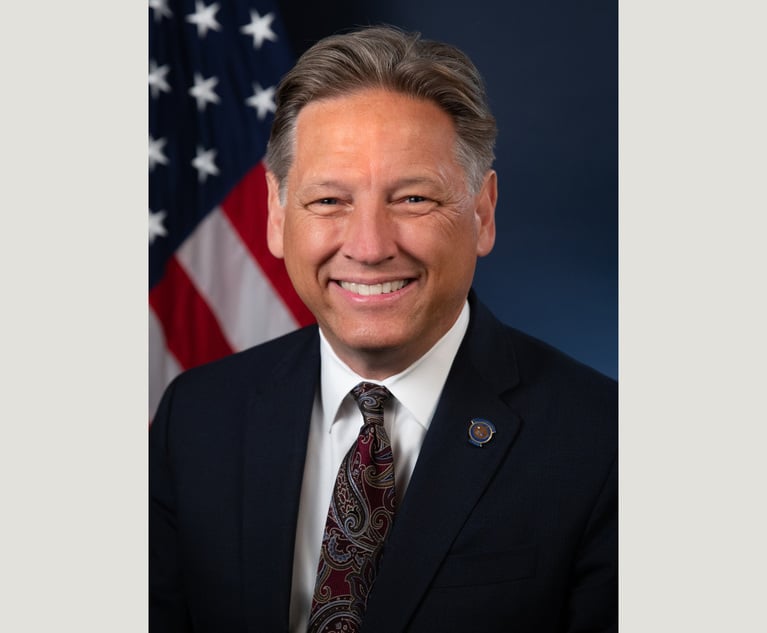 Man trying to unlock iPhone 8 plus.
Man trying to unlock iPhone 8 plus.A California Judge May Have Changed the Conversation Around Biometrics Privacy Rights
U.S. Magistrate Judge Kandis Westmore grappled with the question of whether any individual present at an investigation scene could be compelled to try and unlock devices using "finger, thumb, iris, or other biometric feature.”
January 17, 2019 at 12:24 PM
5 minute read
A California judge has refused to allow law enforcement to use a “finger, thumb, iris, or other biometric feature” to unlock digital devices of any individual present at an investigation, a decision that could impact how courts weigh biometric privacy rights going forward,
In a Jan. 10 order, U.S. Magistrate Judge Kandis Westmore of the Northern District of California wrote the federal government was out of bounds with the Fourth and Fifth Amendments in attempting “to compel any individual present” during a search “to press a finger (including a thumb) or utilize other biometric features” to unlock digital devices for authorized search.
In the order, Westmore explained that biometrics should be granted the same constitutional protections as passwords, noting that courts have previously “found that a passcode cannot be compelled under the Fifth Amendment, because the act of communicating the passcode is testimonial.”
“Courts have an obligation to safeguard constitutional rights and cannot permit those rights to be diminished merely due to the advancement of technology,” she wrote, citing Carpenter v. United States, an influential U.S. Supreme Court decision tackling how the Fourth Amendment should be applied to technological developments. ”Citizens do not contemplate waiving their civil rights when using new technology, and the Supreme Court has concluded that, to find otherwise, would leave individuals 'at the mercy of advancing technology.' ”
But should people expect judges to view things similarly down the road? Brett Max Kaufman, an American Civil Liberty Union attorney who worked on the Carpenter arguments that his organization brought before SCOTUS, said “we're going to start seeing more of these for sure.”
“I think we're about at the moment now where we're a few years past the widespread introduction and adoption of biometrics to protect phones, and we've seen a smattering of cases involving [biometrics] most of which went through the other way [from Westmore's decision] over the years,” he said. “I think we're going to see a lot more judges take on this analysis.”
The order stems from a government investigation into two individuals who allegedly threatened a victim via Facebook Messenger to distribute “an embarrassing video of him” unless he paid. The government applied for a warrant to search and seize items from an Oakland residence connected to the individuals under investigation, including mobile phones and computer, as well as require anyone at the residence to try and unlock devices with biometric means.
The case is under seal other than Westmore's order, and the DOJ attorney listed on the docket, Assistant U.S. Attorney Robert Leach, didn't respond to an email seeking comment.
However, Westmore wrote that the government's argument likens biometric unlocking to “submitting to fingerprinting or a DNA swab,” both of which aren't considered testimonial. The judge however disagreed, reasoning fingerprinting is to “merely compare [a suspect's] fingerprints” to others found on the crime scene, whereas “a successful finger or thumb scan confirms ownership or control of the device, and, unlike fingerprints, the authentication of its contents cannot be reasonably refuted.”
The government seems “to see biometrics as sort of a lifeline on something that they were not constitutionally permitted to do,” Kaufman said. “Their argument is, 'We can take fingerprints, so why can't we just use your fingerprints?' And I think what [Westmore's] opinion does—which is an argument that is going to be persuasive to a lot of judges—is that you can't just blindly apply those. You need to look at why they're doing it. Especially in the context of the technology. I think the public sees these biometrics features as additional security and privacy, and the government is turning them into loopholes for privacy and security.”
Indeed, biometrics technology may be getting more popular. A 2017 Visa survey of Americans pegged the number of those interested in using biometrics for authorizing payments at 86 percent, while a University of Texas survey finds that 58 percent of survey participants were “very comfortable with fingerprint scanning.”
Further, the situation Westmore presided over isn't unprecedented. A U.S. Magistrate Judge in the Northern District of Illinois in 2017, whose order Westmore cited, used the Fourth and Fifth Amendments to deny a warrant to compel individuals present at the scene of an investigation to use their “fingerprints and/or thumbprints” to unlock Apple devices.
“I think that what will happen is there will be other judges that get similar applications” for a warrant as those Westmore considered, said Brian Owsley, assistant professor of law at the University of North Texas at Dallas College of Law, and a former magistrate judge. “In my experience what happens is this is driven oftentimes from Main Justice—the U.S. attorneys and their investigative agents are filing requests around the country, and they'll maybe start adding biometrics language.”
“The next time, maybe a judge in the Middle District of Florida gets something like this, she might say, 'Oh, no, this is like what Westmore did. And that gave me pause, and I agree with her reasoning and stuff like that, and I'm going to issue an order denying [the warrant].”
This content has been archived. It is available through our partners, LexisNexis® and Bloomberg Law.
To view this content, please continue to their sites.
Not a Lexis Subscriber?
Subscribe Now
Not a Bloomberg Law Subscriber?
Subscribe Now
NOT FOR REPRINT
© 2025 ALM Global, LLC, All Rights Reserved. Request academic re-use from www.copyright.com. All other uses, submit a request to [email protected]. For more information visit Asset & Logo Licensing.
You Might Like
View All
After Solving Problems for Presidents, Ron Klain Now Applying Legal Prowess to Helping Airbnb Overturn NYC Ban
7 minute read
DOJ, 10 State AGs File Amended Antitrust Complaint Against RealPage and Big Landlords
4 minute read
Pentagon Settles Suit Seeking to Clear Records of Service Members Discharged for Being LGBTQ
3 minute readTrending Stories
- 1Stevens & Lee Names New Delaware Shareholder
- 2U.S. Supreme Court Denies Trump Effort to Halt Sentencing
- 3From CLO to President: Kevin Boon Takes the Helm at Mysten Labs
- 4How Law Schools Fared on California's July 2024 Bar Exam
- 5'Discordant Dots': Why Phila. Zantac Judge Rejected Bid for His Recusal
Who Got The Work
Michael G. Bongiorno, Andrew Scott Dulberg and Elizabeth E. Driscoll from Wilmer Cutler Pickering Hale and Dorr have stepped in to represent Symbotic Inc., an A.I.-enabled technology platform that focuses on increasing supply chain efficiency, and other defendants in a pending shareholder derivative lawsuit. The case, filed Oct. 2 in Massachusetts District Court by the Brown Law Firm on behalf of Stephen Austen, accuses certain officers and directors of misleading investors in regard to Symbotic's potential for margin growth by failing to disclose that the company was not equipped to timely deploy its systems or manage expenses through project delays. The case, assigned to U.S. District Judge Nathaniel M. Gorton, is 1:24-cv-12522, Austen v. Cohen et al.
Who Got The Work
Edmund Polubinski and Marie Killmond of Davis Polk & Wardwell have entered appearances for data platform software development company MongoDB and other defendants in a pending shareholder derivative lawsuit. The action, filed Oct. 7 in New York Southern District Court by the Brown Law Firm, accuses the company's directors and/or officers of falsely expressing confidence in the company’s restructuring of its sales incentive plan and downplaying the severity of decreases in its upfront commitments. The case is 1:24-cv-07594, Roy v. Ittycheria et al.
Who Got The Work
Amy O. Bruchs and Kurt F. Ellison of Michael Best & Friedrich have entered appearances for Epic Systems Corp. in a pending employment discrimination lawsuit. The suit was filed Sept. 7 in Wisconsin Western District Court by Levine Eisberner LLC and Siri & Glimstad on behalf of a project manager who claims that he was wrongfully terminated after applying for a religious exemption to the defendant's COVID-19 vaccine mandate. The case, assigned to U.S. Magistrate Judge Anita Marie Boor, is 3:24-cv-00630, Secker, Nathan v. Epic Systems Corporation.
Who Got The Work
David X. Sullivan, Thomas J. Finn and Gregory A. Hall from McCarter & English have entered appearances for Sunrun Installation Services in a pending civil rights lawsuit. The complaint was filed Sept. 4 in Connecticut District Court by attorney Robert M. Berke on behalf of former employee George Edward Steins, who was arrested and charged with employing an unregistered home improvement salesperson. The complaint alleges that had Sunrun informed the Connecticut Department of Consumer Protection that the plaintiff's employment had ended in 2017 and that he no longer held Sunrun's home improvement contractor license, he would not have been hit with charges, which were dismissed in May 2024. The case, assigned to U.S. District Judge Jeffrey A. Meyer, is 3:24-cv-01423, Steins v. Sunrun, Inc. et al.
Who Got The Work
Greenberg Traurig shareholder Joshua L. Raskin has entered an appearance for boohoo.com UK Ltd. in a pending patent infringement lawsuit. The suit, filed Sept. 3 in Texas Eastern District Court by Rozier Hardt McDonough on behalf of Alto Dynamics, asserts five patents related to an online shopping platform. The case, assigned to U.S. District Judge Rodney Gilstrap, is 2:24-cv-00719, Alto Dynamics, LLC v. boohoo.com UK Limited.
Featured Firms
Law Offices of Gary Martin Hays & Associates, P.C.
(470) 294-1674
Law Offices of Mark E. Salomone
(857) 444-6468
Smith & Hassler
(713) 739-1250







